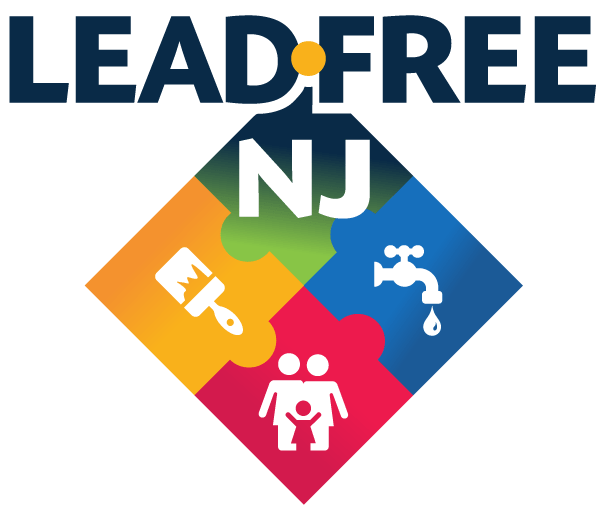Lead-Free New Jersey Hosts Membership Meeting to Engage Communities
On the evening of Wednesday, September 28, Lead-Free New Jersey (LFNJ) hosted its September membership meeting over Zoom. Facilitated by LFNJ co-chairs Debbie Mans and Rashan Prailow, the membership meeting included closed captioning, a live interpreter for Spanish speakers, and actively engaged the more than 55 attendees with polls, conversations in the chat, and opportunities for Q&A. This effort to increase accessibility of engagement through interpreters and closed captioning is part of a broader LFNJ effort to ensure that our work and lead advocacy are inclusive and accessible to all, regardless of background.
Yvette Jordan was in attendance at the meeting, who was recently honored with the Cady Edward Leadership Award from New Jersey Future (NJF) along with lifelong environmental leader Chris Daggett. Yvette was among numerous lead advocates and stakeholders from New Jersey communities in attendance. The event, which spanned two hours, included an introduction to lead laws in New Jersey and featured a panel discussion on lead law implementation, breakout sessions, and resources on how to advocate for management of lead in one’s own community.
“New Jersey Future and our partners decided that the best way to address lead would be to work on it holistically, not just focused on one thing, but to address lead in paint, lead in water, and lead in soil,” said LFNJ Program Manager Heather Sorge, who introduced the collaborative’s work at the start of the meeting. Sorge continued, explaining that LFNJ’s work is currently conducted in three community hubs associated with the Newark Water Coalition, East Trenton Collaborative, and Paterson Habitat for Humanity, with a fourth hub coming soon in South Jersey. LFNJ is looking for suggestions for a South Jersey partner, ideally a nonprofit community-based organization looking to address lead in paint, water, and soil, which can be shared with Heather Sorge. The goal of this membership meeting, according to Sorge, was to communicate with community members and advocates about their experiences with the implementation of laws around lead service lines (LSLs) and lead in paint.
Debbie Mans, co-chair of LFNJ, explained that the new lead laws held significant potential for the management of lead in New Jersey, “but we all know a law is only as good as its enforcement.” According to Mans, a new law effective in summer of 2022 puts the burden of determining whether there is lead in apartments on landlords, rather than tenants, and LFNJ hopes to determine how effective this law is on the ground. Panelist and LFNJ Housing Committee Chair Stephanie Greenwood went on to explain the significance of the law, citing that the law “shifts the burden of finding a lead-safe home from the tenant, who often has the least bargaining power and less of an ability to find a safe home, to the landlord.”
The panel, consisting of LFNJ Housing Committee Chair Stephanie Greenwood, NJF Policy Manager Deandrah Cameron, Homes for All Newark Vice President Kevin Cenac, and Monmouth County Public Health Coordinator Christopher Merkel as panelists, was moderated by Newark Water Coalition Co-founder and Executive Director Anthony Diaz. The resources and ideas discussed in the panel are available on the LFNJ website, including a community toolkit, factsheets for mayors and other players and stakeholders, and other relevant information on getting the lead out of New Jersey. Themes of the panel discussion included the need for securing reliable funding for lead remediation from the state and federal governments; the importance of political will to ensure enforcement and reporting associated with implementation of LSL and lead in paint laws; and the value of efforts at outreach and engagement with community members, utilities, and policymakers.
“In terms of the outreach, we realized that this is not only a utility problem, and so what we’ve created is this primer for mayors, and it’s targeted at town officials and mayors… [about] the aspects of lead service laws that is applicable to administrators,” said panelist Deandrah Cameron, who spearheaded the creation of a LSL primer for elected officials in her work with New Jersey Future and Lead-Free New Jersey. “We know that an ordinance is good, but you need your city council to pass it for our residents. We have to get down to the city council and tell them to pass our ordinance, so that the renter can open the door and the landlord who lives three states away doesn’t just ignore them.” Altogether, the panel provided a productive discussion and background around lead laws in New Jersey and needs moving forward around securing funding, involving communities, and ensuring adequate enforcement of these ordinances.
To close the meeting, participants went into breakout rooms to discuss their own priorities for lead law implementation across the state and in their communities. When reporting back to the full group, major takeaways included: 1) the need to exert interagency pressure because lead is such a widespread issue, 2) the importance of education in order to develop informed advocates and tenants, and 3) the remaining gaps in implementation measures and monitoring of lead laws in New Jersey. Altogether, the Lead-Free New Jersey Membership Meeting provided an opportunity for advocates to gather and communicate while working towards achieving a healthy, resilient, lead-free state in which all New Jerseyans can live, work, and play.
Lead-Free New Jersey Program Manager Heather Sorge summed up the importance of the meeting. “Through our annual LFNJ member meetings, we are able to facilitate a strategic discussion with all hands on deck. At the state level and within our community hubs, we work collaboratively to effectively end the harmful impacts of lead for New Jerseyans, in our schools, our homes, our water, and our communities.”
/Hannah Reynolds
